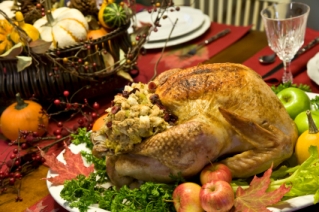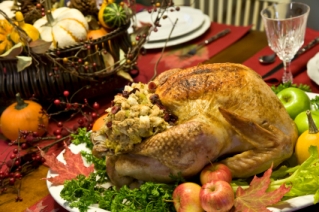How Your Diet Can Help You Beat the Flu This Winter
How Your Diet Can Help You Beat the Flu This Winter
It's that time of year again, and the flu is here in full force. Maybe you've got it already, or are trying to avoid getting it in the first place. Either way, our expert tips will help you navigate the flu season and hopefully escape unscathed.

Flu season is inevitable, but contracting it is not. And no, that does not mean hibernating throughout the seasonal months. Even though there is potential to catch the flu, there are steps to help prevent it from striking you. Getting the flu shot, obsessively washing hands, the whole nine yards… Sometimes, though, the flu still intrudes and interferes with busy schedules. Read on to learn how to not get the flu and how to treat the flu if caught.
Flu-Fighters
Warding off the flu really comes down the immune system. Build up a stronger immunity and avoid the flu with the following nutrients and food sources.
Vitamin A
Respiratory, gastrointestinal, and genitourinary tracts act as barrier against infections. Vitamin A deficiency has been associated with impaired immunity and increased infection risk. The intake of vitamin A can contribute to a healthy immune system. Sources: carrots, sweet potatoes, tomatoes, pumpkin, spinach
Vitamin B6
Several reactions in the body are vitamin B6 dependent, including those involving immune responses. Adequate B6 intake can be important for optimal immune system function. Sources: salmon, turkey, avocados, fortified breakfast cereals
Vitamin B12 & Folate
B12 and folate are both B vitamins. They work together to S-adenosylmethionine (SAMe), a compound in the body that plays a role in the immune system. Adequate vitamin B12 and/or folate intake can help keep SAMe levels sufficient.
Vitamin B12: only found in animal products; eggs, beef, pork, fish, shellfish, dairy products
Folate: spinach, broccoli, beans and lentils, enriched flours and pastas
Vitamin C
Vitamin C is an antioxidant, protecting the cell membranes against free radicals. Free radicals can cause damage to the cell and lead to improper immune responses. The vitamin also stimulates white blood cells that act as a line of defense by attacking foreign bacteria. Sources: oranges and orange juice, yellow bell peppers, kale, strawberries
Vitamin D
A vitamin D deficiency has been shown to increase the susceptibility to an infection. With adequate intake, a decrease in inflammation and an increase in anti-inflammatory responses can occur. Sources: sunlight, salmon, egg yolks, shiitake mushrooms, fortified products such as milk and orange juice
Vitamin E
Vitamin E, like vitamin C, is an antioxidant that protects against cell damage. Vitamin E supplementation in excess enhances immune function and decreases susceptibility to certain infections. Sources: almonds, peanuts, spinach, broccoli, and vegetable oils like sunflower and safflower
Iron
Too little or too much iron can lead to anemia or excess damaging radicals, respectfully. However since iron is essential in many biological processes, maintaining balance can contribute to normal immune responses in the body. Sources: beef, clams, whole grains, sunflower seeds, nuts, spinach, dark chocolate
Selenium
The potent and powerful antioxidant properties of selenium can contribute to a stronger immune system. Selenium deficiency, compared to adequate selenium intake, results in weaker immune responses. Sources: Brazil nuts, shiitake mushrooms, sunflower seeds, pinto beans, cabbage
Zinc
Zinc deficiency impairs the function of immune cells while too much can diminish immune responses. Maintain strong immunity by balancing zinc in the body. Sources: oysters, red meats and poultry, nuts, crab and lobster, whole grains
So, you got the flu…
Flu-fighting foods lost the war? Fight back just as hard to conquer those pesky, unpleasant flu symptoms. The BRAT diet stands for bananas, rice, applesauce, toast. Sounds bland, right? The lack of flavor does not contribute to the lack of benefits. An upset stomach appreciates mild flavors and smells, especially with nausea and vomiting involved. Consisting of "binding" and low-fiber foods, the BRAT diet has the capability to firm stools and defeat diarrhea. Vomiting and diarrhea can ultimately lead to dehydration and electrolyte imbalances. Bananas are high in potassium, an electrolyte, and can replace if lost and depleted. Sports drinks can also help to maintain hydration and replete electrolyte losses. A high fever and loss of appetite can ultimately contribute to weight loss. Protein and calorically-dense foods can keep the body strong and prevent muscle wasting. Understandably, steaks and other rich protein sources do not sound too appetizing with a weak stomach. Initially, implement the BRAT diet and other bland foods. Introduce and work up to a normal diet as the stomach starts to tolerate more variety. Precautions and a flu game plan can ultimately help you avoid the flu.
References:
Aranow C. Vitamin D and the Immune System. Journal of investigative medicine : the official publication of the American Federation for Clinical Research. 2011;59(6):881-886. doi:10.231/JIM.0b013e31821b8755.
Cherayil BJ. The role of iron in the immune response to bacterial infection. Immunologic research. 2011;50(1):1-9. doi:10.1007/s12026-010-8199-1.
Hoffmann PR, Berry MJ. The influence of selenium on immune responses.Molecular nutrition & food research. 2008;52(11):1273-1280. doi:10.1002/mnfr.200700330. Micronutrient Information Center. Immunity. Available at: http://lpi.oregonstate.edu/mic/micronutrients-health/immunity
University of Maryland Medical Center. S-Adenosylmethionine. Complementary and Alternative Medicine Guide. Available at: https://umm.edu/health/medical/altmed/supplement/sadenosylmethionine
-
Healths Angels Lose Their Halos
V
-
These 4 Drinks Can Help You Shrink Your Belly
Many foods and nutrients can be powerful belly-fat fighters, helpi
-
Why bistroMD May be the Right Diet Plan for you
Why bistroMD May be the Right Diet Plan for you
-
Want To Lose Weight? Try These Foods That Increase Metabolism
Losing weight can be hard work. Not only do you have to cut out
-
Nutrisystem Diet: What To Know
Overview
-
Week 16: Lessons Learned
By Sarah This week marks the end of my fo
- DON'T MISS
- Week 19: The good, the bad, and the awesome
- 1200 calorie diet for women
- Diet Meal Delivery: Embrace a Simple, Healthy Lifestyle
- How To Lose Weight With Only Half a Lemon Per Day
- Alkaline diet review
- Week 11: Tri time
- Healthy Eating with Free Citrus Fruits
- For Smart, Permanent Weight Loss Seek Balance In Your Life
- How Healthy Prepared Meals Can Combat Overeating at Thanksgiving
- Week Four: One Month into the Program and My Clothes are Getting Loose!




